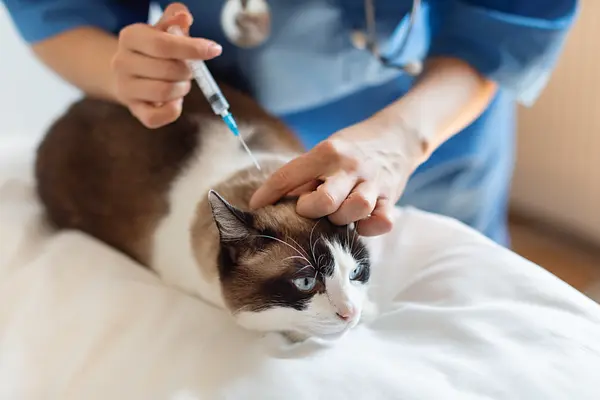As a devoted pet parent, there's nothing more important than keeping your furry family member healthy and protected. While my expertise typically focuses on our canine companions, I understand that many pet lovers share their homes with both cats and dogs – and all our four-legged friends deserve the very best care!
Today, let's dive into everything you need to know about cat vaccinations. Think of this as your comprehensive roadmap to protecting your feline friend from preventable diseases, delivered with the same warmth and care you'd want for any beloved family member.
Why Vaccinations Matter for Your Cat
Just like with puppies, vaccinations are your cat's first line of defense against serious, potentially life-threatening diseases. These tiny injections work by training your cat's immune system to recognize and fight off specific viruses and bacteria before they can cause harm.
The beautiful thing about vaccines is that they're preventive medicine at its finest – much easier (and less expensive) than treating diseases after they occur. Plus, keeping your cat up-to-date on vaccinations helps protect other pets in your community too!
Core vs. Non-Core Vaccines: Understanding the Difference
Core Vaccines (Essential for All Cats)
These are the "must-have" vaccines that every cat should receive, regardless of their lifestyle:
FVRCP Vaccine - This combination vaccine protects against: - Feline Viral Rhinotracheitis (feline herpes virus) - Calicivirus - Panleukopenia (feline distemper)
Rabies Vaccine - Required by law in most areas and essential for your cat's safety
Non-Core Vaccines (Lifestyle-Dependent)
These vaccines may be recommended based on your cat's specific risk factors:
- Feline Leukemia (FeLV) - Especially important for outdoor cats or multi-cat households
- Feline Immunodeficiency Virus (FIV) - For high-risk cats
- Bordetella - For cats in boarding or high-stress environments
- Chlamydia - Sometimes recommended for multi-cat environments
The Complete Vaccination Timeline
Kitten Vaccination Schedule (6-16 weeks)
6-8 weeks: - First FVRCP vaccine - First FeLV vaccine (if recommended)
10-12 weeks: - Second FVRCP vaccine - Second FeLV vaccine (if applicable) - First Rabies vaccine (timing varies by local laws)
14-16 weeks: - Third FVRCP vaccine - Final kitten boosters
Adult Cat Vaccination Schedule
Annual Boosters: - FVRCP vaccine (some vets recommend every 3 years after initial series) - Rabies vaccine (1-year or 3-year versions available) - FeLV vaccine (for at-risk cats)
As Needed: - Other non-core vaccines based on lifestyle assessment
Factors That Influence Your Cat's Vaccination Needs
Indoor vs. Outdoor Lifestyle
Indoor cats typically need fewer vaccines but should still receive core vaccinations. Even indoor cats can be exposed to diseases through: - Escaped outdoor adventures - Contact with other pets - Viruses brought in on clothing or shoes
Outdoor cats face higher risks and typically need more comprehensive vaccination protocols, including FeLV and other lifestyle-specific vaccines.
Multi-Cat Households
If you have multiple cats, vaccination becomes even more critical. Diseases can spread quickly between cats sharing the same space, food, and litter boxes.
Travel and Boarding
Cats who travel or stay in boarding facilities may need additional vaccines like Bordetella to protect against kennel cough and other respiratory infections.
What to Expect During Vaccination Visits
Before the Visit
- Keep a record of previous vaccinations
- Note any changes in your cat's behavior or health
- Prepare questions for your veterinarian
During the Visit
- Your vet will perform a health check
- Discuss your cat's lifestyle and risk factors
- Administer appropriate vaccines
- Schedule follow-up appointments
After the Visit
- Monitor your cat for any reactions (rare but possible)
- Keep vaccination records updated
- Set reminders for future boosters
Managing Vaccination Records and Schedules
Keeping track of your cat's vaccination schedule can feel overwhelming, especially if you're also managing training schedules and health records for other pets. This is where having a reliable tracking system becomes invaluable.
While many pet parents use paper records or simple calendars, digital solutions can make life much easier. Apps designed for pet care can help you set reminders, track vaccination dates, and even coordinate care between multiple family members.
Cost Considerations and Money-Saving Tips
Vaccinations are an investment in your cat's long-term health, but costs can add up. Here are some ways to manage expenses:
- Low-cost vaccination clinics - Many communities offer affordable options
- Pet insurance - Can help cover routine care
- Wellness plans - Many vet offices offer payment plans
- Multi-pet discounts - Ask if your vet offers discounts for multiple pets
Signs Your Cat Needs Immediate Veterinary Attention
While vaccines are generally very safe, watch for these signs after vaccination:
- Severe lethargy lasting more than 24 hours
- Difficulty breathing
- Facial swelling
- Persistent vomiting or diarrhea
- Signs of severe pain
Creating a Comprehensive Pet Care Routine
Whether you're caring for cats, dogs, or both, staying organized is key to providing the best care possible. Consider using tools that help you track not just vaccinations, but all aspects of your pets' health and daily care.
For dog owners, the Doggy Time app offers an excellent solution for tracking puppy training activities, setting health reminders, logging daily habits, and creating comprehensive care schedules. While designed specifically for dogs, the organizational principles can inspire how you approach care for all your pets. The app's smart alarms and collaborative features make it easy for families to work together in providing consistent, loving care for their furry friends.
Important Health Disclaimer
This blog post is intended for educational purposes only and should not replace professional veterinary advice. Always consult with a qualified veterinarian to determine the best vaccination schedule for your individual cat based on their health status, lifestyle, and local disease risks. Vaccination protocols may vary based on geographic location, local regulations, and emerging health recommendations.
Remember, every cat is unique, and the best vaccination schedule is one that's tailored specifically to your feline friend's needs. Work closely with your veterinarian to create a plan that keeps your cat healthy, happy, and protected throughout their life.
Your dedication to learning about proper cat care shows just how much you love your feline family member. Here's to many years of purrs, head bumps, and healthy adventures together! 🐱💕






